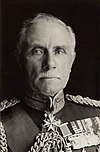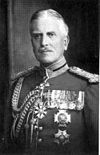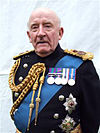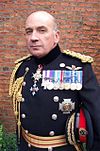Chief of the General Staff (United Kingdom)
The Chief of the General Staff (CGS) has been the title of the professional head of the British Army since 1964. The CGS is a member of both the Chiefs of Staff Committee and the Army Board; he is also the Chair of the Executive Committee of the Army Board. Prior to 1964, the title was Chief of the Imperial General Staff (CIGS). Since 1959, the post has been immediately subordinate to the Chief of the Defence Staff, the post held by the professional head of the British Armed Forces.
| Chief of the General Staff | |
|---|---|
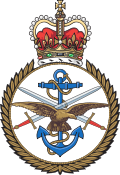 | |
 Flag of the Chief of the General Staff | |
| Ministry of Defence British Army | |
| Abbreviation | CGS |
| Member of | Defence Council Army Board Chiefs of Staff Committee |
| Reports to | Chief of the Defence Staff |
| Nominator | Secretary of State for Defence |
| Appointer | The Monarch On the advice of the Prime Minister, subject to formal approval by the King-in-Council |
| Term length | No fixed length |
| Precursor | Commander-in-Chief of the Forces |
| Formation | 1904, 1964 |
| First holder | Sir Neville Lyttelton |
| Deputy | Deputy Chief of the General Staff |
The current Chief of the General Staff is General Sir Patrick Sanders, who succeeded his predecessor, General Sir Mark Carleton-Smith, in June 2022. In 2024, he will be replaced by Lieutenant General Sir Roland Walker, who is currently serving as the Deputy Chief of the Defence Staff.[1]
Responsibilities edit
The Chief of the General Staff (CGS) is the professional head of the Army, with responsibility for developing and generating military capability from an integrated Army (Regular and Reserve) and for maintaining the fighting effectiveness, efficiency and morale of the Service. The CGS reports to the Chief of the Defence Staff (CDS) and, as a Service COS, has a right of direct access to the Secretary of State and the Prime Minister. The CGS is a member of the Defence Council and the Army Board, the Armed Forces Committee, the Chiefs of Staff Committee and the Senior Appointments Committee. Responsibile for:
- Maintains the institutional health of the Army by exercising Full Command responsibility for all Army personnel
- Ensures the efficient and effective governance of the service
- Chairs the Executive Committee of the Army Board and the Army Command Group
- Contributes to the conduct of defence higher level business, with a particular responsibility for providing specialist advice on Army matters
- Develops future Army capability within the context of Defence strategic direction and resource allocation
- Leads the senior management team of the British Army[2]
Background edit
The title was also used for five years between the demise of the Commander-in-Chief of the Forces in 1904 and the introduction of Chief of the Imperial General Staff in 1909. The post was then held by General Sir Neville Lyttelton and, briefly, by Field Marshal Sir William Nicholson.
Throughout the existence of the post the Chief of the General Staff has been the First Military Member of the Army Board.[3]
| Royal Navy | British Army | Royal Air Force | Combined | |
|---|---|---|---|---|
| 1645 | N/A | Commander-in-Chief of the Forces (1645/60–1904, intermittently) | N/A - No Air Force until 1918 | N/A - Inter-service co-ordination carried out from 1904 by the Committee of Imperial Defence under the chairmanship of the Prime Minister |
| 1689 | Senior Naval Lord (1689–1771) | |||
| 1771 | First Naval Lord (1771–1904) | |||
| 1904 | First Sea Lord (1904–1917) | Chief of the General Staff (1904–1909) | ||
| 1909 | Chief of the Imperial General Staff (1909–1964) | |||
| 1917 | First Sea Lord and Chief of the Naval Staff (1917–present) | |||
| 1918 | Chief of the Air Staff (1918–present) | |||
| 1923 | Chairman of the Chiefs of Staff Committee (1923–1959, held by one of the service heads until 1956) | |||
| 1959 | Chief of the Defence Staff (1959–present) | |||
| 1964 | Chief of the General Staff (1964–present) |
Roles edit
The Chief was responsible for commanding the entire British Army. During the Second World War, General Brooke focused on grand strategy, and his relationships, through the Combined Chiefs of Staff with his American counterparts. He was also responsible for the appointment and evaluation of senior commanders, allocation of manpower and equipment, and the organisation of tactical air forces in support of land operations of field commanders; he also had primary responsibility for supervising the military operations of the Free French, Polish, Dutch, Belgian, and Czech units reporting to their governments in exile in London. Brooke vigorously allocated responsibilities to his deputies, and despite the traditional historical distrust that had existed between the military and the political side of the War Office, he got along quite well with his counterpart, the Secretary of State for War, first David Margesson and later, Sir James Grigg. [4]
Appointees edit
The following table lists all those who have held the post of Chief of the General Staff or its preceding positions. Ranks and honours are as at the completion of their tenure:
| No. | Portrait | Name | Took office | Left office | Time in office | Ref. |
|---|---|---|---|---|---|---|
| Chiefs of the General Staff | ||||||
| 1 | General Sir Neville Lyttelton (1845–1931) | 12 February 1904 | 2 April 1908 | 4 years, 50 days | [5] | |
| 2 | Field Marshal Sir William Nicholson (1845–1918) | 2 April 1908 | 22 November 1909 | 1 year, 234 days | [6] | |
| Chiefs of the Imperial General Staff | ||||||
| 2 | Field Marshal Sir William Nicholson (1845–1918) | 22 November 1909 | 15 March 1912 | 2 years, 114 days | [7] | |
| 3 | Field Marshal Sir John French (1852–1925) | 15 March 1912 | 6 April 1914 | 2 years, 22 days | [8] | |
| 4 | General Sir Charles Douglas (1850–1914) | 6 April 1914 | 25 October 1914 † | 202 days | [9] | |
| 5 | Lieutenant-General Sir James Wolfe Murray (1853–1919) | 25 October 1914 | 26 September 1915 | 1 year, 154 days | [10] | |
| 6 | Lieutenant-General Sir Archibald Murray (1860–1945) | 26 September 1915 | 23 December 1915 | 88 days | [11] | |
| 7 | General Sir William Robertson (1860–1933) | 23 December 1915 | 19 February 1918 | 2 years, 58 days | [12] | |
| 8 | Field Marshal Sir Henry Wilson (1864–1922) | 19 February 1918 | 19 February 1922 | 4 years | [13] | |
| 9 | Field Marshal Rudolph Lambart, 10th Earl of Cavan (1865–1946) | 19 February 1922 | 19 February 1926 | 4 years | [14] | |
| 10 | Field Marshal Sir George Milne (1866–1948) | 19 February 1926 | 19 February 1933 | 7 years | [15] | |
| 11 | Field Marshal Sir Archibald Montgomery-Massingberd (1871–1947) | 19 February 1933 | 15 May 1936 | 3 years, 86 days | [16] | |
| 12 | Field Marshal Sir Cyril Deverell (1874–1947) | 15 May 1936 | 6 December 1937 | 1 year, 205 days | [17] | |
| 13 | General John Vereker, 6th Viscount Gort (1886–1946) | 6 December 1937 | 3 September 1939 | 1 year, 271 days | [18] | |
| 14 | General Sir Edmund Ironside (1880–1959) | 4 September 1939 | 26 May 1940 | 266 days | [19] | |
| 15 | Field Marshal Sir John Dill (1881–1944) | 26 May 1940 | 25 December 1941 | 1 year, 213 days | [20] | |
| 16 | Field Marshal Alan Brooke, 1st Viscount Alanbrooke (1883–1963) | 25 December 1941 | 25 June 1946 | 4 years, 182 days | [21] | |
| 17 | Field Marshal Bernard Montgomery, 1st Viscount Montgomery of Alamein (1887–1976) | 26 June 1946 | 1 November 1948 | 2 years, 129 days | [21][22] | |
| 18 | Field Marshal Sir William Slim (1891–1970) | 1 November 1948 | 1 November 1952 | 4 years | [23] | |
| 19 | Field Marshal Sir John Harding (1896–1989) | 1 November 1952 | 29 September 1955 | 2 years, 332 days | [24] | |
| 20 | Field Marshal Sir Gerald Templer (1898–1979) | 29 September 1955 | 29 September 1958 | 3 years | [25] | |
| 21 | Field Marshal Sir Francis Festing (1902–1976) | 29 September 1958 | 1 November 1961 | 3 years, 33 days | [26] | |
| 22 | General Sir Richard Hull (1902–1989) | 1 November 1961 | April 1964 | 2 years, 5 months | [27][28][29] | |
| Chiefs of the General Staff | ||||||
| 22 | Field Marshal Sir Richard Hull (1902–1989) [a] | April 1964 | 8 February 1965 | 10 months | - | |
| 23 | General Sir James Cassels (1907–1996) | 8 February 1965 | 1 March 1968 | 3 years, 22 days | [28] | |
| 24 | General Sir Geoffrey Baker (1912–1980) [b] | 1 March 1968 | 1 April 1971 | 3 years, 31 days | [30][31][32] | |
| 25 | Field Marshal Sir Michael Carver (1915–2001) [a] | 1 April 1971 | 19 July 1973 | 2 years, 109 days | [33][31] | |
| 26 | General Sir Peter Hunt (1916–1988) [b] | 19 July 1973 | 15 July 1976 | 2 years, 362 days | [34][35] | |
| 27 | General Sir Roland Gibbs (1921–2004) [b] | 15 July 1976 | 14 July 1979 | 2 years, 364 days | [36][37] | |
| 28 | Field Marshal Sir Edwin Bramall (1923–2019) [a] | 14 July 1979 | 1 August 1982 | 3 years, 18 days | [38][39][40] | |
| 29 | General Sir John Stanier (1925–2007) [b] | 1 August 1982 | 28 July 1985 | 2 years, 361 days | [35][41][42] | |
| 30 | General Sir Nigel Bagnall (1927–2002) | 28 July 1985 | 10 September 1988 | 3 years, 44 days | [43] | |
| 31 | General Sir John Chapple (1931–2022) | 10 September 1988 | 14 February 1992 | 3 years, 157 days | [44] | |
| 32 | General Sir Peter Inge (1935–2022) [a][b] | 14 February 1992 | 15 March 1994 | 2 years, 29 days | [35][45][46] | |
| 33 | General Sir Charles Guthrie (born 1938) [a] | 15 March 1994 | 3 February 1997 | 2 years, 325 days | [46][47] | |
| 34 | General Sir Roger Wheeler (born 1941) [b] | 3 February 1997 | 17 April 2000 | 3 years, 74 days | [48][49] | |
| 35 | General Sir Michael Walker (born 1944) [a] | 17 April 2000 | 1 February 2003 | 2 years, 290 days | [50][51][52] | |
| 36 | General Sir Mike Jackson (born 1944) | 1 February 2003 | 29 August 2006 | 3 years, 209 days | [53] | |
| 37 | General Sir Richard Dannatt (born 1950) [b] | 29 August 2006 | 28 August 2009 | 2 years, 364 days | [54][55] | |
| 38 | General Sir David Richards (born 1952) [a] | 28 August 2009 | 15 September 2010 | 1 year, 18 days | [56][57] | |
| 39 | General Sir Peter Wall (born 1955) | 15 September 2010 | 5 September 2014 | 3 years, 355 days | [58] | |
| 40 | General Sir Nick Carter (born 1959) [a] | 5 September 2014 | 11 June 2018 | 3 years, 279 days | [59] | |
| 41 | General Sir Mark Carleton-Smith (born 1964) | 11 June 2018 | 13 June 2022 | 4 years, 2 days | [60] | |
| 42 | General Sir Patrick Sanders (born 1966) | 13 June 2022 | Incumbent | 1 year, 344 days | [61] | |
See also edit
Notes edit
References edit
Bibliography edit

- Fraser, David (1997). Alanbrooke. HarperCollins. ISBN 9780006388630.
- Hamilton, Nigel (1986). Monty: Final Years of the Field Marshal 1944–1976. McGraw-Hill. ISBN 9780070258075.










